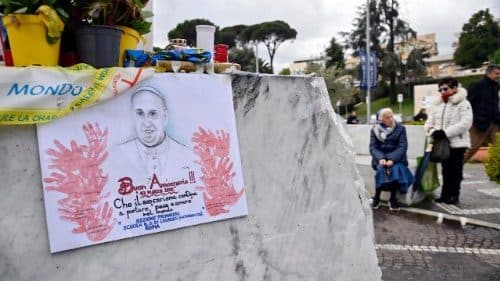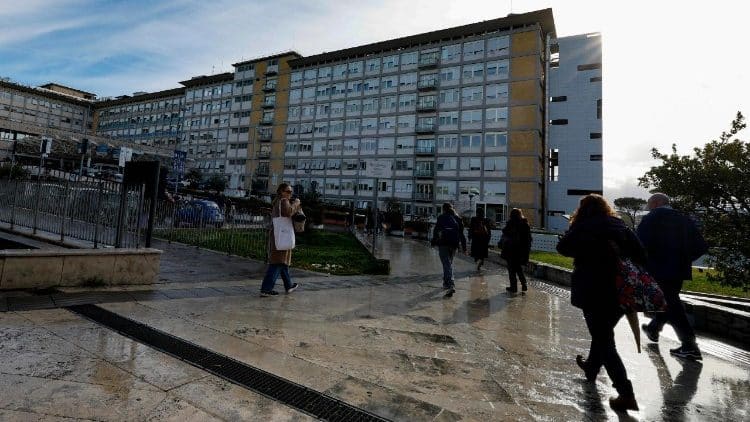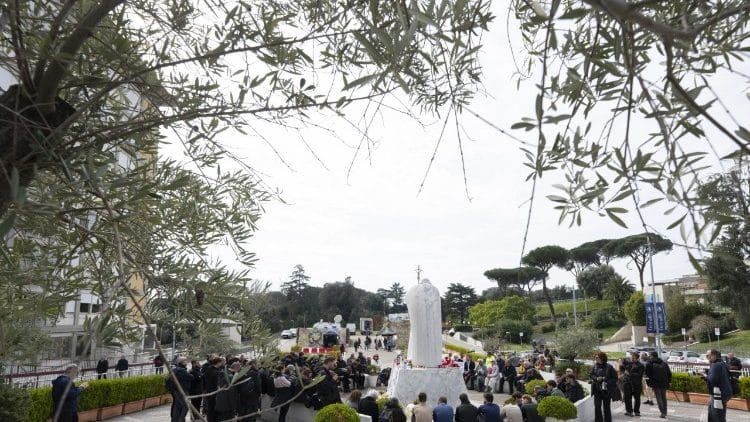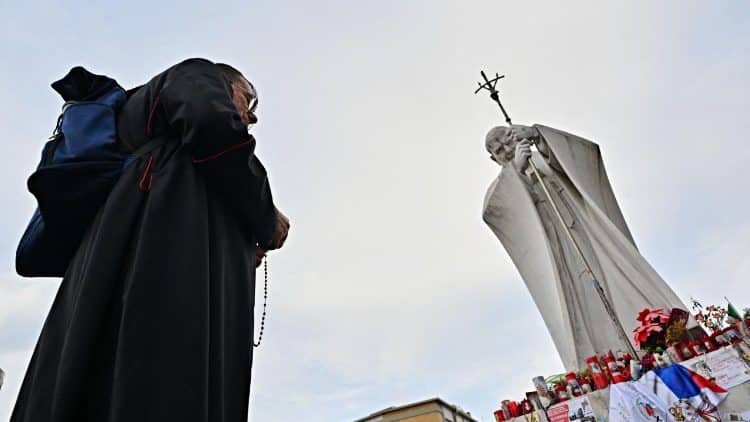Waiting on the Lord: a call to patience and faith
Words of the Pope at the Homily

At 5.30 pm this afternoon, the Feast of the Presentation of the Lord and the XXVIII World Day of Consecrated Life, the Holy Father Francis celebrated Holy Mass in the Vatican Basilica.
Cardinals, Bishops, and Priests belonging to Orders, Congregations, and religious institutes concelebrated with the Holy Father.
The rite opened with the blessing of the candles and the procession, and continued with the Eucharistic celebration.
We publish below the homily that the Pope pronounced during the Holy Mass:
Homily of the Holy Father
While the people waited for the Lord’s salvation the prophets announced his coming, as the prophet Malachi proclaims, “the Lord whom you seek will suddenly come to his temple; the messenger of the covenant in whom you delight, behold, he is coming.” (3:1). Simeon and Anna are the image and figure of this longing. Upon seeing the Lord enter his temple, they are enlightened by the Holy Spirit and recognize him as the child whom Mary carries in her arms. They had been waiting for him all their lives: Simeon, “righteous and devout, looking for the consolation of Israel, and the Holy Spirit was upon him” (Lk 2:25); Anna, who “did not depart from the temple” (Lk 2:37).
It is good for us to look at these two elders who were waiting patiently, vigilant in spirit and persevering in prayer. Their hearts have stayed awake, like an eternal flame. They are advanced in age, but young at heart. They do not let the days wear them down, for their eyes remain fixed on God in expectation (cf. Ps 145:15). Fixed on God in expectation, always in expectation. Along life’s journey, they have experienced hardships and disappointments, but they have not given in to defeat: they have not “retired” hope. As they contemplate the child, they recognize that the time has come, the prophecy has been fulfilled, the One they sought and yearned for, the Messiah of the nations, has arrived. By staying awake in expectation of the Lord, they are able to welcome him in the newness of his coming.
Brothers and sisters, waiting for God is also important for us, for our faith journey. Every day the Lord visits us, speaks to us, reveals himself in unexpected ways and, at the end of life and time, he will come. He himself exhorts us to stay awake, to be vigilant, to persevere in waiting. Indeed, the worst thing that can happen to us is to let “our spirit doze off”, to let the heart fall sleep, to anesthetize the soul, to lock hope away in the dark corners of disappointment and resignation.
I think of you, consecrated sisters and brothers, and of the gift that you are; I think of us Christians today: are we still capable of waiting? Are we not at times too caught up in ourselves, in things and in the intense rhythm of daily life to the point of forgetting God who always comes? Are we not too enraptured by our good works, which runs the risk of turning even religious and Christian life into having “many things to do” and neglecting the daily search for the Lord? Don’t we sometimes risk planning personal and community life by calculating the odds of success, instead of cultivating the small seed entrusted to us with joy and humility, with the patience of those who sow without expecting anything and those who know how to wait for God’s time and let him surprise us? We must recognize at times that we have lost the ability to wait. This is due to several obstacles, of which I would like to highlight two.
The first obstacle that makes us lose the ability to wait is neglect of the interior life. This is what happens when weariness prevails over amazement, when habit takes the place of enthusiasm, when we lose perseverance on the spiritual journey, when negative experiences, conflicts or seemingly delayed fruits turn us into bitter and embittered people. It is not good to ruminate on bitterness, because in a religious family, as in any community and family, bitter and “sour-faced” people are deflating, people who seem to have vinegar in their hearts. It is necessary then to recover the lost grace: to go back and, through an intense interior life, return to the spirit of joyful humility, of silent gratitude. This is nourished by adoration, by the work of the knees and the heart, by concrete prayer that struggles and intercedes, capable of reawakening a longing for God, that initial love, that amazement of the first day, that taste of waiting.
The second obstacle is adapting to a worldly lifestyle, which ends up taking the place of the Gospel. Ours is a world that often runs at great speed, that exalts “everything and now,” that is consumed in activism and seeks to exorcise life’s fears and anxieties in the pagan temples of consumerism or in entertainment at all costs. In such a context, where silence is banished and lost, waiting is not easy, for it requires an attitude of healthy passivity, the courage to slow our pace, to not be overwhelmed by activities, to make room within ourselves for God’s action. These are lessons of Christian mysticism. Let us be careful, then, that the spirit of the world does not enter our religious communities, ecclesial life and our individual journey, otherwise we will not bear fruit. The Christian life and apostolic mission need the experience of waiting. Matured in prayer and daily fidelity, waiting frees us from the myth of efficiency, from the obsession with performance and, above all, from the pretense of pigeonholing God, because he always comes in unpredictable ways, he always comes at times that we do not choose and in ways that we do not expect.
As the French mystic and philosopher Simone Weil states, we are the bride waiting in the night for the arrival of the bridegroom, and: “The role of the future wife is to wait…. To long for God and to renounce all the rest, that alone can save us” (Waiting for God, Milan 1991, 196). Sisters, brothers, let us cultivate in prayer the spirit of waiting for the Lord and learn about the proper “passivity of the Spirit”: thus, we will be able to open ourselves to the newness of God.
Like Simeon, let us also pick up this child, the God of newness and surprises. By welcoming the Lord, the past opens up to the future, the old in us opens up to the new that he awakens. This is not easy, we know this, because, in religious life as in the life of every Christian, it is difficult to go against the “force of the old”. “It is not easy for the old man in us to welcome the child, the new one – to welcome the new one, in our old age to welcome the new one – … The newness of God presents itself as a child and we, with all our habits, fears, misgivings, envies, – let us think of envies! – worries, come face to face with this child. Will we embrace the child, welcome the child, make room for the child? Will this newness really enter our lives or will we rather try to combine old and new, trying to let ourselves be disturbed as little as possible by the presence of God’s newness?” (C.M. MARTINI, Something So Personal. Meditations on Prayer, Milan 2009, 32-33).
Brothers and sisters, these questions are for us, for each of us, for our communities and for the Church. Let us be restless, let us be moved by the Spirit, like Simeon and Anna. If, like them, we live in expectation, safeguarding our interior life and in conformity with the Gospel, if, like them, we live in expectation, we will embrace Jesus, who is the light and hope of life.
Related

The Pope in Gemelli, condition stable
Exaudi Staff
13 March, 2025
1 min

The Pope at Gemelli Hospital: A Peaceful Night
Exaudi Staff
13 March, 2025
2 min

Pope at Gemelli Hospital: Peaceful Night
Exaudi Staff
12 March, 2025
1 min

Pope at Gemelli Hospital: Slight Improvement
Exaudi Staff
11 March, 2025
1 min
 (EN)
(EN)
 (ES)
(ES)
 (IT)
(IT)

